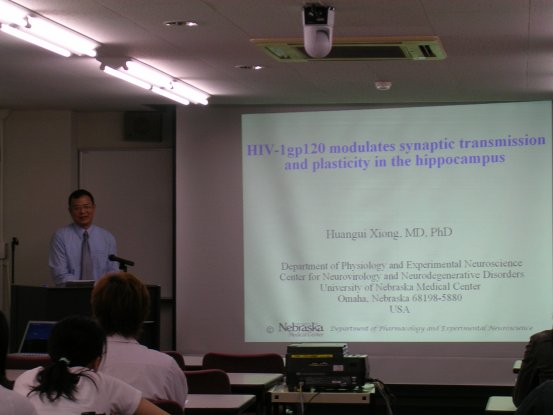 |
2006 lecture series
60th IBB Seminar
- HIV-1 gp120 modulates synaptic transmission and plasticity via CXCR4 in the hippocampus -
| 講師: | Huangui Xiong, MD, PhD Associate Professor Chief, neurophsyiology Section Department of Pharmacology and Experimental Neuroscience University of Nebraska Medical Center U. S. A. |
| 日時:平成18年10月13日(金)13:00~14:00 会場:東京医科歯科大学 生体材料工学研究所ゼミナール室(3階) |
Abstract: In the immature hippocampus, the giant depolarizing potentials (GDPs) are recurrent network-driven synaptic events generated by γ–aminobutyric acid (GABA), which in neonatal life is depolarizing and excitatory. To understand how human immunodeficiency virus type one (HIV-1) infection in the immature brain impairs brain growth and development, we studied the effects of HIV-1 envelope glycoprotein, gp120, a viral toxin shed in abundance by infected cells, on spontaneous occurring GDPs recorded in the CA3 pyramidal cells in neonatal (P2–P6) Sprague–Dawley rat hippocampal slices using whole-cell patch technique. The gp120-induced enhancement of GDPs was blocked by T140, a highly specific antagonist for the chemokine receptor, CXCR4, indicating the involvement of CXCR4 in the gp120-induced increase of GDPs. Bath application of stromal cell-derived factor-1α (SDF-1α), the only CXCR4 ligand, mimicked the effects of gp120 on GDPs, supporting the engagement of CXCR4 receptors in the gp120-induced increase of GDP occurrence. These results demonstrate that gp120 enhances GDPs in the neonatal rat hippocampus. This enhancement may cause an excessive increase in intracellular calcium and resultant neuronal injury, leading to retardation of the brain and behavioural development as seen in paediatric AIDS patients.
 |